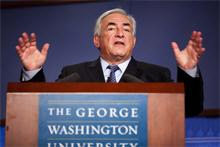
Typical street scene in Santa Ana, El Salvador. (Photo: iStock)
IMF Survey: IMF Chief Calls for New Approach to Globalization
April 5, 2011
- Global recovery unbalanced between and within countries
- Benefits of growth must be more broadly shared
- Strengthened international cooperation key to post-crisis world
In a speech ranging across events in Japan, the Middle East, Europe, and Africa, IMF Managing Director Dominique Strauss-Kahn discussed risks for the global economy and called for a new approach to economic policymaking in the wake of the recent crisis.

IMF head Dominique Strauss-Kahn addresses Washington students about the global economy (photo: IMF/Steve Jaffe)
GEORGE WASHINGTON UNIVERSITY
“We need a new form of globalization, a fairer form of globalization, a globalization with a more human face,” Strauss-Kahn told a crowded audience of students at George Washington University in Washington D.C.
Speaking ahead of the Spring Meetings of the International Monetary Fund, organized jointly with the World Bank April 15-17, he singled out three areas for improvement: a new approach to macroeconomic and financial sector policies, a new approach to social cohesion, and a new approach to cooperation and multilateralism.
Fragile outlook clouded by uncertainty
Prospects for the global economy remain very uncertain, he said, with difficulties in Japan, Europe, the Middle East, and Africa weighing down the outlook. While the global economy continued to recover, growth was uneven both between countries and within them. “Numerous black swans are now swimming in the global economic lake.” The IMF will publish its next forecast for the global economy on April 11.
He pointed in particular to the Middle East, noting that it is going through an “historic transformation” as “citizens are seeking greater freedom, and a fairer distribution of economic opportunities and resources.” The immediate challenge for the Middle East, he stated, was “to preserve social cohesion without undermining macroeconomic stability.”
Growth in advanced economies, what he termed the “ground zero of the financial crisis,” was still too low and unemployment still too high. At the same time, the emerging market economies—especially in Asia and Latin America—were powering ahead, and dealing with overheating. The low-income countries had proved remarkably resilient, but were now being hit by high food and fuel prices.
Rethinking macroeconomic policy
Strauss-Kahn said the global crisis had forced a fundamental rethink of macroeconomic policy. “As you all know, the global financial crisis devastated the global economy and caused incalculable hardship and suffering all over the world. But it did more than this—it also devastated the intellectual foundations of the global economic order of the last quarter century.”
The IMF has recently held a high-level conference, involving a number of major economists, to rethink macroeconomic policy in the wake of the crisis.
“In designing a new macroeconomic framework for a new world,” Strauss-Kahn stated, “the pendulum will swing—at least a little—from the market to the state, and from the relatively simple to the relatively more complex.”
Strauss-Kahn argued that policy must go beyond price stability and look also at financial stability, incorporating macro-prudential tools. The crisis has showed the value of fiscal policy, which had been the “neglected child” of the policy toolkit. The IMF’s early call for fiscal stimulus had helped the world avoid a global depression. He also called for more progress with financial sector reform, including across borders, and supported moves for a financial activities tax, saying the financial sector must be prepared to pay for the dangers inherent in excessive risk taking.
More focus on inequality
Speaking to around 260 students in the George Washington University Business School, Strauss-Kahn called for policymakers to pay more attention to inequality and social cohesion. He suggested that inequality, which was a factor in Middle East unrest, might also have been among the root causes of the global crisis, and that sustainable global growth is associated with more equal income distribution.
The IMF chief said globalization had lifted hundreds of millions of people around the world out of poverty. “But this globalization had a dark side—a large and growing chasm between rich and poor. While trade globalization is associated with lower inequality, financial globalization—the big story of recent years—increased it.”
The benefits of growth must be broadly shared, not just captured by a privileged few, he argued. “While the market must stay center stage, the invisible hand must not become the invisible fist.”
Building on multilateralism
He stressed the virtues of enhanced cooperation and multilateralism in the post-crisis world, noting that “the great challenges of today all require a collective solution.”
“In such a world, multilateral institutions—as forums of global cooperation—will become even more important. But they must stay relevant. They must adapt to the new globalization,” Strauss-Kahn stated.
He pointed out that the IMF is striving to better understand the complex interconnections running through the global economy and to strengthen its ability to prevent crises, not only manage them. But this required legitimacy, he noted, making recent IMF governance reforms that had given dynamic emerging markets increased representation particularly important.







